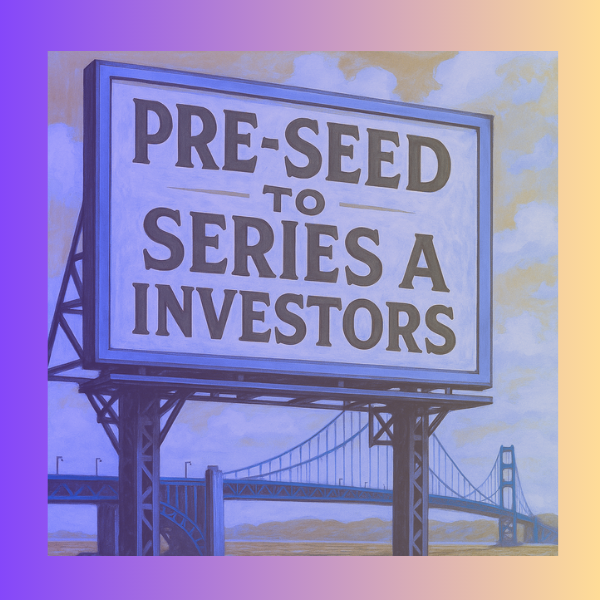When pitching to investors, you’re selling more than just a vision or a market opportunity. You’re selling your ability to execute. And that’s where the challenge lies for first-time founders.
There’s a reason many venture capitalists hesitate to invest in founders who are launching their first startup.
Why Venture Capitalists Are Wary of First-Time Founders
There’s a reason many VCs hesitate to invest in first-time founders. It's not just about bias, it’s about risk management.
The Reality of Building a Startup
Building a company isn’t just about having a groundbreaking idea. It’s about surviving chaos and making tough decisions.
Startups demand that founders:
- Learn from mistakes and pivot quickly.
- Manage relationships with co-founders, employees, and investors.
- Control burn rates and extend runway.
- Talk to customers and close revenue.
- Build great products and scale operations.
- Raise additional capital and create multiple distribution channels.
In short, experience matters. And for many VCs, experience is non-negotiable.
Why VCs Focus on Execution
VCs have seen many startups with great ideas fail because the founders lacked the ability to execute. A founder’s track record provides clues about how they’ll handle challenges like:
- Finding product-market fit.
- Resolving team conflicts.
- Scaling operations under time pressure.
Investors are placing bets on people, not just ideas. If they’re unsure about a founder’s ability to deliver, it can make the difference between a “yes” and a “pass.”
The Scar Tissue Advantage
A founder who has built and sold a company, or even failed, has something first-time founders lack: scar tissue. They’ve been through the wringer and have learned hard lessons about what works, what doesn’t, and where the traps lie.
In other words, they haven't "been in the trenches".

For example:
- They understand that hiring too fast can cripple a startup.
- They know that product-market fit isn’t just a buzzword; it’s the difference between scaling and failing.
- They’ve realized that successful fundraising is built on relationships cultivated months or years in advance, not just a compelling pitch deck.
VCs value these lessons because they know building a startup is one of the hardest things a person can do. They’re betting on founders who’ve already learned from their mistakes (and won’t repeat them).
Why Failure Is a Badge of Honor
Interestingly, many experienced founders who’ve failed are seen as more investable than first-time founders.
Failure teaches resilience, problem-solving, and humility, traits that VCs value. A failed startup often shows VCs that the founder has already learned critical lessons the hard way.
Are You Crazy Enough to Do It Again?
The best founders are the ones who, despite all the challenges, choose to do it again. They’ve endured the sleepless nights, the existential crises, and the near-death moments of their previous ventures. Yet they’re still willing to dive back into the fire.
This level of conviction, resilience, and (some might say) insanity is what VCs look for. These founders are more thoughtful, disciplined, and better prepared the second time around. They know how to:
- Choose better co-founders.
- Spend money where it matters and cut costs where it doesn’t.
- Focus on what truly drives growth and success.
The Long-Term Mindset
Experienced founders don’t just chase the quick win, they think in terms of long-term value creation. VCs often describe these founders as “having seen the movie before,” meaning they anticipate problems and act proactively to avoid them.
What If You’re a First-Time Founder? Here's How to Win a VC Over
If you’re launching your first startup, how can you stand out to investors who may hesitate to back you? Here are three ways:
- Surround Yourself with Experience
Bring on advisors or hire leaders who have “been there, done that.” Building a strong team with complementary skills can balance out your inexperience.
- Show Relentless Execution
Prove traction. If you can demonstrate customer acquisition, revenue growth, or a clear path to scaling, you’ll reduce perceived risk for investors.
- Bootstrap Longer
If you can achieve meaningful results without outside capital, you’ll show VCs that you’re resourceful and capable of executing under constraints.
How to Overcome Common VC Objections
When pitching to VCs, anticipate their objections and address them directly:
"You lack experience."
Response: Highlight your team's expertise or the experienced advisors supporting your venture. Share concrete examples of how you’ve already solved complex problems.
"The market is crowded."
Response: Explain how your startup is differentiated and provide data to back it up (e.g., customer testimonials, unique product features, or faster growth metrics).
"You haven’t raised before."
Response: Emphasize bootstrapped milestones. Show how your team has achieved results without external funding, proving your scrappiness and execution.
Learn more about how to decode VC speak so you understand whether investors are really interested or not.
Final Takeaway: Earn the Right to Be Trusted
VCs aren’t just investing in companies. They’re investing in you.
If you don’t have experience, prove you can execute. Show traction, surround yourself with smart people, and come in with a game plan.
Because vision is great, but execution is what gets funded.
FAQs
Why do VCs prefer experienced founders?
Experienced founders have faced the challenges of building a startup and bring critical lessons learned, such as achieving product-market fit, managing burn rates, and building relationships with investors.
Can first-time founders still get VC funding?
Yes, first-time founders can attract funding by demonstrating traction, surrounding themselves with experienced advisors, and showing relentless execution.
How can first-time founders address their lack of experience?
By bringing in experienced team members or advisors, bootstrapping to prove resourcefulness, and focusing on measurable milestones like revenue or user growth.
The Bottom Line
Not all VCs avoid first-time founders, but it’s a common trend for a reason. The challenges of building a company require more than just ambition and a good idea; they require the hard-earned wisdom that comes from experience.
By recognizing this reality and addressing your gaps, you can still position yourself as a founder worth betting on.
PS: Subscribe to the newsletter for startups & VC insiders - EverythingStartups.

.png)




.png)

